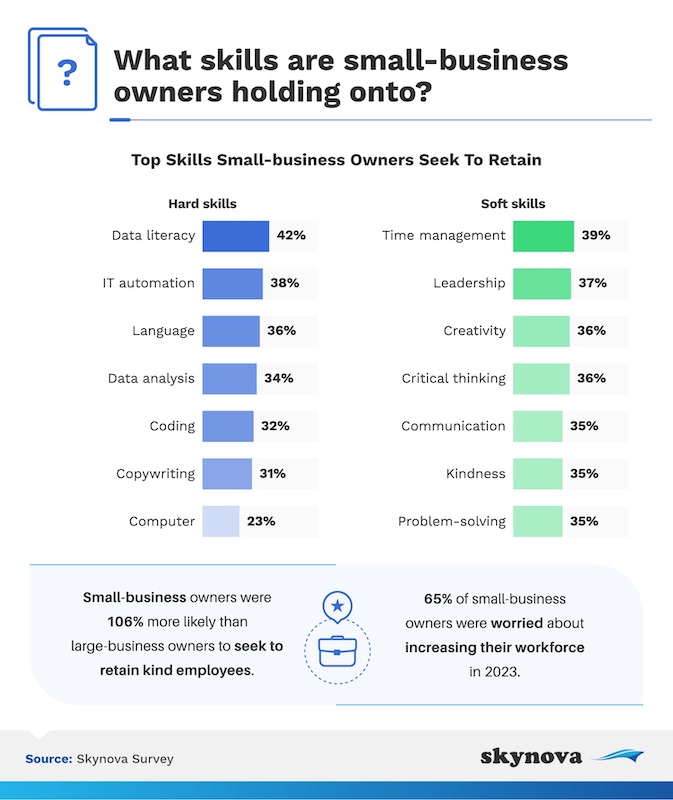Technical.ly CEO Christopher Wink previously explained labor hoarding as “the tendency for employers to limit layoffs in any forthcoming economic downturn because the memory of the pandemic hiring crunch is so recent.” Basically, it’s what’s happening when hiring slows, but layoffs aren’t growing.
The concept remains relevant after the world’s Big Tech companies, consulting firms and other industries’ economic giants impose wave after wave of job cuts.
But labor hoarding isn’t unique to big companies. Skynova, a company that provides businesses invoice templates and related transaction-processing software, explored this in a recent report on the labor hoarding dynamic, including the various measures companies take to prevent laying off workers.
Overall, its report chronicles why small businesses are labor hoarding, how they do it, and how it’s worked out for them so far. Here are a few relevant highlights from the study.
Why do employers want to hoard labor?
The report found that more than 90% of small businesses surveyed are currently labor hoarding, with 89% of the 1,010 business owners saying they’d continue to in 2023. Companies hoard labor for various reasons, but nearly half of the respondents did so because they have strong teams and want to keep them that way. Almost the same amount said it was because layoffs can hurt their teams’ morale.
Moreover, seven in 10 cited recession and inflation fears, while 65% worried about the cost of adding employees — which makes sense considering the price tag attached to hiring, onboarding and training new workers.
What skills matter most to hoarding employers?
The report suggests that small businesses may value certain employee skills more highly than others. Soft skills like time management, leadership and creativity can be difficult to gauge in an interview and might not emerge until after an extended tenure. That might be why small business owners surveyed wanted to hold onto these soft skills the most. They also hoped to retain some specific hard skills, including:
- Data literacy
- IT automation
- Language
- Data analysis
- Coding

A graph from Skynova’s report. (Courtesy image)
How do small businesses retain desirable workers?
Nearly 70% of small business owners said they’re willing to take a pay cut to avoid layoffs. The majority (three in five) also said they enacted a hiring freeze. While this measure is usually meant to cut operating costs, it also allows a business to focus resources on its current team. Some other layoff-prevention methods included:
- Reducing employee benefits and perks
- Switching to a remote work format to cut costs
- Reducing some teammates’ work week to four days
- Letting freelancers and contractors go
Given how many people left the workforce during the Great Resignation, businesses of all sizes have also increasingly focused on keeping their workers happy. Half of those company leaders surveyed said they paid employees more to help them stay. Respondents offered some other tips for retaining workers:
- Connect better with employees
- Foster transparent communication
- Improve the work environment
- Offer remote work options
- Ensure a healthy work culture
- Stop micromanagement
- Increase paid time off
The big payoff
All these efforts appeared to actually help the respondents keep the most desirable employees. Those surveyed shared that retaining strong teams and skilled workers saved them over $4,500 on average per hire.
In other words: If you can hang onto your best talent in this uncertain economic landscape, you might just come out stronger on the other side.
Before you go...
Please consider supporting Technical.ly to keep our independent journalism strong. Unlike most business-focused media outlets, we don’t have a paywall. Instead, we count on your personal and organizational support.
3 ways to support our work:- Contribute to the Journalism Fund. Charitable giving ensures our information remains free and accessible for residents to discover workforce programs and entrepreneurship pathways. This includes philanthropic grants and individual tax-deductible donations from readers like you.
- Use our Preferred Partners. Our directory of vetted providers offers high-quality recommendations for services our readers need, and each referral supports our journalism.
- Use our services. If you need entrepreneurs and tech leaders to buy your services, are seeking technologists to hire or want more professionals to know about your ecosystem, Technical.ly has the biggest and most engaged audience in the mid-Atlantic. We help companies tell their stories and answer big questions to meet and serve our community.
Join our growing Slack community
Join 5,000 tech professionals and entrepreneurs in our community Slack today!

The person charged in the UnitedHealthcare CEO shooting had a ton of tech connections

Delaware students take a field trip to China using their tablets and ChatGPT

Northern Virginia defense contractor acquires aerospace startup in $4B deal



